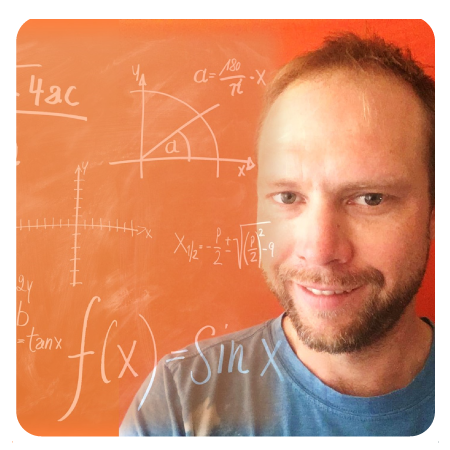Welcome to our best live online homeschool high school chemistry course.
Welcome to our online homeschool high school chemistry course named First Semester Chemistry.

"As a homeschool family, we thought that chemistry would be an impossible topic. Not the case. My daughter enjoyed the class, and learned way more than her regular school friends anyhow." -- Ann T.
First Semester Chemistry covers the topics found in the first half of a normal high school chemistry textbook. It’s the continuation course following Intro to Chemistry.
You’ll learn about science by using analogies that relate to concepts you already know well. You’ll be able to explain the world scientifically using Plain English, and you’ll be designing experiments and organizing scientific data. Most of the math, technical jargon, and complicated chemicals have been removed from the topics so you can truly master the chemistry concepts.
There’s a written assignment, with complete video solutions, for each lesson so that the ideas sink in. You’ll get up to speed with chemistry fast and develop the skills needed to have fun succeeding in future chemistry and science courses.
Live Classes with Instructor: This online homeschool high school chemistry course is a live, group class that meets regularly on Zoom with Dr. Scott, the course instructor.
Time commitment: Approximately 3-4 hours per week, including in class (live on Zoom) plus out of class time.
Materials Included: The course has 45 printable pdf files including worksheets, answer keys, and class notes and a video textbook including 31 hours (230 videos) of lesson, experiments with simulated data, and instructions for writing lab reports.
Course duration: Semester length (half school year) or summer session for half of a high school credit.
Instructor Support Included: Dr. Scott teaches the live class on Zoom. He is available for questions and evaluates worksheets by email. There are grades and a certificate of completion at the end.
Learners completing First Semester Chemistry will be able to:
We’ll learn about ions and binary ionic compounds, using the octet rule. We will learn about EM waves and line emission spectra for elements.
We’ll learn about polyatomic ions and general ionic compounds We will learn about absorbance for EM waves.
We will learn the theory behind covalent bonding and it’s connection to Pauling electronegativity. It’s probably the most important concept in all of chemistry!
We will learn about polarity and resonance for molecules.
We’ll apply valence shell electron pair repulsion theory (VSEPR) to determine molecule shapes. There’s a hands-on experiment to make the shapes using balloons. It’s Dr. Scott’s personal favorite experiment.
We learn about solution chemistry and the states of matter. There’s an experiment to separate salt and sand using changes of state.
We learn the theory of strong and weak attractions between molecules, known as intermolecular forces (IMFs). There’s an experiment to mix liquids to evaluate the principle of Like Dissolves Like.
We learn some advanced IMF theory, including hydrogen bonding and the expansion of freezing water. There’s an experiment to measure freezing water expansion.
We discuss lab reports and Dr. Scott provides help for recording data from and designing experiments.
We learn to balance chemical reactions for combustion, neutralization, and other types of reactions.
We look at large, biochemical molecules including soap and fats. There’s a hands on activity to see and feel how soap works.
We learn to make limiting reactant calculations and use an ICE table to predict the outcome of chemical reactions.
We continue to work on 2-3 lab reports and experiments as a final course project.
We learn about concentration, called Molarity or capital-M in chemistry. We focus on neutralization reactions, including carbonate and gas releasing bases. We have a brief conceptual introduction to pH.
The final topic and experiment is titration. We have a simple version you can set up easily and safely in your kitchen (optional). We will discuss and make indicator solution.
First Semester Chemistry follows Intro to Chemistry in the chemistry course series.
After completing this course, you’ll be ready for our advanced chemistry courses including Second Semester Chemistry.

Hi, I’m Dr. Scott, the course instructor and author of the digital textbook that you get with the course.
I’m a former college chemistry professor that knows how to make learning science fun and easy. I spent waaay too many years watching students fail “hard” college science courses because they didn’t get the fundamentals.
My courses will show you how to learn science, and I guarantee they’ll prepare you for future science classes. The easy way.